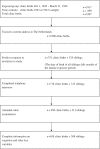Prenatal famine exposure and cognition at age 59 years
- PMID: 21247885
- PMCID: PMC3066429
- DOI: 10.1093/ije/dyq261
Prenatal famine exposure and cognition at age 59 years
Abstract
Background: Despite the perceived importance of early life nutrition for mental development, few studies have related gestational undernutrition to later-life cognitive functioning. We investigated the consequences of gestational exposure to the Dutch famine of 1944-45 for cognitive functioning at the age of 59 years.
Methods: We recruited men and women who were (i) born in birth clinics in Amsterdam, Rotterdam and Leiden, between January 1945 and March 1946, whose mothers experienced famine during or immediately preceding pregnancy (n = 354); (ii) born in the same three institutions during 1943 and 1947, whose mothers did not experience famine during this pregnancy (n = 292); or (iii) same-sex siblings of those in the first two categories (n = 311). We assessed cognitive performance at the age of 59 years by means of a comprehensive test battery.
Results: All cognitive functioning test scores were within normal ranges for this age group. There were no differences in cognitive performance at the age of 59 years between individuals exposed to gestational undernutrition and those without this exposure. For the general cognitive index, a summary measure across six functional domains (mean 100, standard deviation (SD) 15 points), famine exposure was associated with a decrease of 0.57 points [95% confidence interval (95% CI) -2.41 to 1.28] points. Individuals exposed to famine in gestational weeks 1-10 had a cognitive functioning index 4.36 (95% CI 8.04-0.67) points lower than those without this exposure. Within-sibling-pair analyses gave consistent results.
Conclusion: We found no overall association between maternal exposure to acute famine in pregnancy and cognitive performance of the offspring at the age of 59 years, but cannot rule out an association specific to early pregnancy exposure.
Figures
References
-
- Uylings HBM. Development of the human cortex and the concept of “critical” or “sensitive” periods. Human Devel Lang Learning. 2006;56:59–90.
-
- Shigematsu I, Ito C, Kamada N, Akiyama M, Sasaki H. Effects of A-Bomb Radiation on the Human Body. Langhorne, PA: Harwood Academic; 1995.
-
- Malanga CJ, Kosofsky BE. Effect of drugs of abuse on brain development. In: Charney DS, Nestler EJ, editors. Neurobiology of Mental Illness. New York: Oxford University Press; 2004. pp. 720–39.
-
- Winzer-Serhan UH. Long-term consequences of maternal smoking and developmental chronic nicotine exposure. Front Biosci. 2008;13:636–49. - PubMed
-
- Williams JH, Ross L. Consequences of prenatal toxin exposure for mental health in children and adolescents: a systematic review. Eur Child Adolesc Psychiatry. 2007;16:243–53. - PubMed


